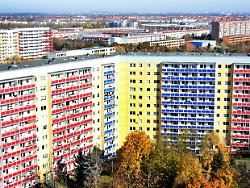Tuesday, November 16, 2021
Against rent increases
Cities ask traffic lights to pay
Housing is becoming more and more expensive and buildings have to be renovated to protect the climate: The German Association of Cities has come up with a packed list of requirements. The traffic light is supposed to provide a cash injection in the double-digit billions.
The German Association of Cities has directed demands in the double-digit billions for climate protection, social housing and investments to the future traffic light coalition. Specifically, it is about more money for social housing and a more effective brake on rent increases. “That belongs in the coalition agreement. Housing is becoming more and more expensive,” said the President of the City Council, Leipzig’s Lord Mayor Burkhard Jung from the SPD in Erfurt. The decline in social housing, on which more and more people on low incomes are dependent, should be stopped. According to the City Council, the number of social housing in Germany fell by around 1.5 million between 2002 and 2020.
To break this trend, funding would have to be increased significantly by one billion euros per year. In addition, at the beginning of its three-day general meeting in Erfurt, the Association of Cities called for the cap for rent increases to be put to the test. People who still lived in cheap apartments below the local comparable rent could currently see their rent rise by up to 15 percent within three years. This cap for rent increases would have to be checked and lowered during the coalition negotiations.
In addition to social housing, significant investments must be made in climate protection. “We have a major investment backlog,” said Jung. It is time to remind the future coalition members of the SPD, FDP and the Greens that 60 percent of investments in Germany are triggered by the municipalities and that climate protection cannot simply be ordered by the federal government, said Jung at the beginning of a three-day general meeting of the city council in the Thuringian state capital.
“Can’t do that with your own strength”
The future federal government required a financing program for municipal climate protection in the double-digit billions annually. For the energetic renovation of buildings alone there is a nationwide requirement of eleven billion euros this year, said Jung. “We cannot do this with our own strength.” He also referred to business tax losses due to the corona pandemic. In spite of the improved tax forecast, the municipalities were missing a total of around five billion euros this year and next, according to an estimate by the City Council. As in 2020, tax deficits would have to be offset.
Vice-President Markus Lewe of the CDU in Münster called for the so-called regionalization funds for buses and trains to be increased from EUR 9.0 billion by EUR 1.5 billion from 2022. The federal government would have to contribute more to the local transport costs.
The association, which according to its own information represents around 3200 cities and municipalities with around 53 million inhabitants, also spoke out in favor of a quick statutory vaccination requirement for employees at schools, daycare centers, and in the health and care sector. “We want schools and daycare centers to remain open.” The force of the fourth corona wave must also be broken with a nationwide 2G rule in the leisure and cultural sector – including the Christmas markets. Before the Prime Minister’s Conference and the consultation of the Bundestag on the new corona rules on Thursday, the city leaders appealed to federal politicians to extend the epidemic situation of national scope, contrary to the plans, beyond November 25th.
